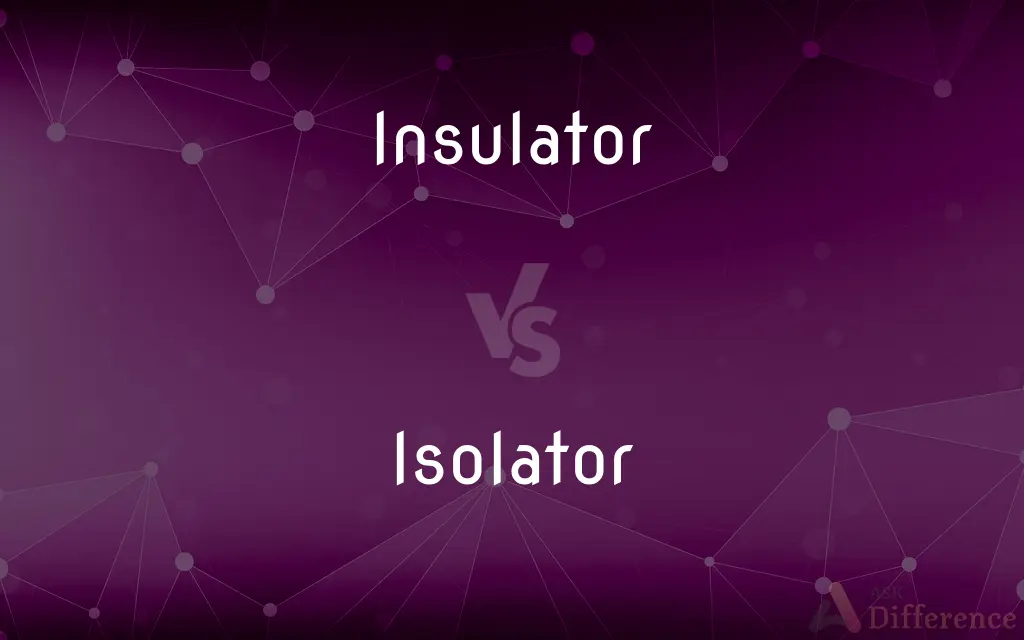Insulator vs. Isolator — What's the Difference?
By Maham Liaqat & Fiza Rafique — Updated on April 24, 2024
Insulators resist electrical current and are integral to electrical safety, while isolators are mechanical switches that ensure an electrical circuit is completely de-energized for maintenance.

Difference Between Insulator and Isolator
Table of Contents
ADVERTISEMENT
Key Differences
Insulators are materials that impede the flow of electric current, used to protect us from electric shocks and keep electrical wires from unintended contacts. Whereas, isolators are devices designed to physically disconnect electrical circuits from power sources, ensuring safety during repairs or inspections.
An insulator functions by having a high resistance to electrical current, often made from materials like glass, rubber, or plastic. On the other hand, an isolator is a mechanical switch that can be operated manually or automatically to make or break an electrical connection.
While insulators are passive components that do not have moving parts, isolators include moving parts and are active components in an electrical system, used to control the presence or absence of electrical current.
Insulators are crucial in everyday electrical appliances and power systems to prevent accidental electrocution. On the other hand, isolators are specifically used in electrical substations, industrial equipment, and maintenance operations to ensure a circuit is completely de-energized.
Insulators are continuously active as they constantly resist electrical current, whereas isolators are used selectively, especially during maintenance or emergency situations to safely disconnect electrical circuits.
ADVERTISEMENT
Comparison Chart
Definition
Material that resists electric flow
Mechanical switch for safety
Use
Continuous electrical resistance
Used during maintenance
Operation
Passive, no moving parts
Active, with moving parts
Made from
Rubber, glass, plastic
Metal, composite materials
Primary Function
Prevent electric shocks
Ensure circuit is de-energized
Compare with Definitions
Insulator
A substance that does not readily allow the passage of heat or sound.
Glass is a good insulator, often used in windows to keep homes warm.
Isolator
A component that separates parts of an electrical system to prevent undesired current paths.
Isolators help in segmenting the network for easier fault management.
Insulator
A component used to support and separate electrical conductors without allowing current through itself.
Porcelain insulators are commonly used on power lines.
Isolator
Equipment designed to physically separate electrical components.
Each generator has an isolator to ensure it can be maintained safely.
Insulator
A material or device that prevents the passage of electrical current.
Rubber gloves act as insulators for electricians working on live wires.
Isolator
A mechanical device used in power systems for safety purposes.
Isolators are critical for ensuring that no current flows during system checks.
Insulator
A material that resists electrical leakage.
Air is also an insulator that can prevent electrical arcs in specific configurations.
Isolator
A device for isolating a section of electrical circuit by interrupting the flow.
Technicians switched the isolator before beginning the maintenance on the power line.
Insulator
Something that insulates, especially from heat.
The foam in walls is an insulator against both cold and noise.
Isolator
A switch that ensures a device is completely disconnected from power sources.
The safety protocol requires activating the isolator during equipment upgrades.
Insulator
A material that insulates, especially a nonconductor of sound, heat, or electricity.
Isolator
To cause to be alone or apart, as in being inaccessible or unable to move about
The police isolated the area until more help could arrive.
Insulator
A device that insulates.
Isolator
To place in quarantine.
Insulator
A substance that does not transmit heat (thermal insulator), sound (acoustic insulator) or electricity (electrical insulator).
Isolator
To cause to become socially or politically unengaged or ostracized
An immigrant who was isolated by his poor language skills.
Insulator
A non-conductive structure, coating or device that does not transmit sound, heat or electricity (see image)
To isolate electrical wires from the pylons supporting them, one often uses glass insulators.
Isolator
To render free of external influence; insulate
A system of government that isolated its citizens from foreign ideas.
Insulator
A person who installs insulation.
Isolator
To identify or distinguish as a separate entity or group
The study tried to isolate the effects of changing schools on student performance.
Insulator
One who, or that which, insulates.
Isolator
(Chemistry) To separate (a substance) in pure form from a combined mixture.
Insulator
A substance or object that insulates; a nonconductor; as, polyurethane foam is a popular thermal insulator.
Isolator
(Microbiology) To separate (a pure strain of a microorganism or virus) from a mixed culture.
Insulator
A material such as glass or porcelain with negligible electrical or thermal conductivity
Isolator
(Psychology) To separate (experiences or memories) from the emotions relating to them.
Isolator
To set apart (a component, circuit, or system) from a source of electricity.
Isolator
To insulate or shield.
Isolator
Separated from others
An isolate population.
Isolator
A person, thing, or group that has been isolated, as by geographic, ecologic, or social barriers.
Isolator
(Microbiology) A population of microorganisms or viruses that has been isolated.
Isolator
(Linguistics) A language isolate.
Isolator
An electrical device that detects short circuits and isolates them.
Isolator
A device that isolates something from the surrounding environment to keep it sterile.
Isolator
A transparent box for holding small live animals.
Isolator
One who, or that which, isolates.
Common Curiosities
What is an insulator used for?
Insulators are used to prevent unwanted flow of current by providing resistance to the passage of electricity.
Where are insulators commonly used?
Insulators are commonly used in home appliances, electronic devices, and power lines.
Can isolators be used in home electrical setups?
Yes, isolators can be used in home electrical systems, particularly in main power supply systems for safety.
What materials are typical insulators made of?
Typical insulators are made from rubber, glass, and plastic.
What is the primary safety function of an isolator?
The primary safety function of an isolator is to ensure an electrical circuit is completely de-energized for maintenance or emergency purposes.
Is an isolator always necessary in an electrical circuit?
An isolator is not always necessary but is critical for circuits requiring maintenance or repair to ensure safety.
Can an insulator fail? If so, under what conditions?
An insulator can fail under extreme conditions such as high voltage, physical damage, or environmental factors like moisture.
How does an isolator function?
An isolator functions as a manual or automatic switch to disconnect power from a part of an electrical circuit.
What is a common example of an insulator in everyday life?
A common example of an insulator is the plastic coating on electrical wires and cables.
Are insulators and isolators the same?
No, insulators are materials that resist electrical current, while isolators are mechanical devices that disconnect circuits.
Can isolators prevent electrical accidents?
Yes, isolators can prevent electrical accidents by ensuring circuits are completely de-energized before any work is done.
How is an isolator operated?
Isolators can be operated manually or automatically depending on the design and purpose.
What distinguishes an isolator from a circuit breaker?
An isolator is used to disconnect a circuit without safety interruption capabilities, unlike a circuit breaker that can interrupt a circuit in an overload condition.
How often should isolators be checked or replaced?
Isolators should be checked periodically, especially before any planned maintenance, and replaced as per the manufacturer’s guidelines or wear signs.
Why is it important to use both insulators and isolators in electrical networks?
Using both insulators and isolators enhances safety by preventing unintended current flow and safely disconnecting parts of the circuit during maintenance.
Share Your Discovery

Previous Comparison
Warehouse vs. Depot
Next Comparison
Final vs. LastAuthor Spotlight
Written by
Maham LiaqatCo-written by
Fiza RafiqueFiza Rafique is a skilled content writer at AskDifference.com, where she meticulously refines and enhances written pieces. Drawing from her vast editorial expertise, Fiza ensures clarity, accuracy, and precision in every article. Passionate about language, she continually seeks to elevate the quality of content for readers worldwide.
















































